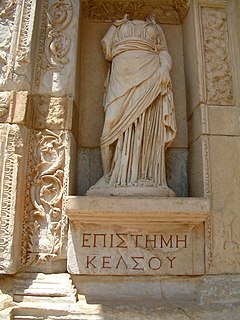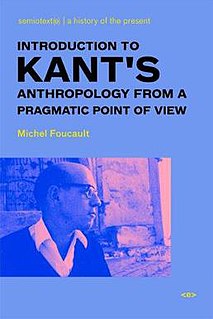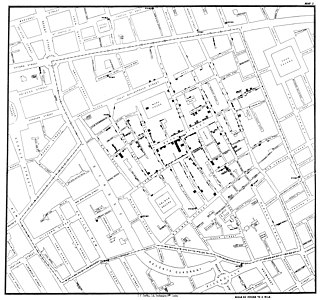
Sociology of religion is the study of the beliefs, practices and organizational forms of religion using the tools and methods of the discipline of sociology. This objective investigation may include the use of both quantitative methods and qualitative approaches such as participant observation, interviewing, and analysis of archival, historical and documentary materials.
Reason is the capacity of consciously making sense of things, establishing and verifying facts, applying logic, and changing or justifying practices, institutions, and beliefs based on new or existing information. It is closely associated with such characteristically human activities as philosophy, science, language, mathematics and art, and is normally considered to be a distinguishing ability possessed by humans. Reason, or an aspect of it, is sometimes referred to as rationality.

Discourse denotes written and spoken communications:

The sociology of knowledge is the study of the relationship between human thought and the social context within which it arises, and of the effects prevailing ideas have on societies. It is not a specialized area of sociology but instead deals with broad fundamental questions about the extent and limits of social influences on individuals' lives and the social-cultural basics of our knowledge about the world. Complementary to the sociology of knowledge is the sociology of ignorance, including the study of nescience, ignorance, knowledge gaps, or non-knowledge as inherent features of knowledge making.

"Episteme" is a philosophical term derived from the Ancient Greek word ἐπιστήμη epistēmē, which can refer to knowledge, science or understanding, and which comes from the verb ἐπίστασθαι, meaning "to know, to understand, or to be acquainted with".
Governmentality is a concept first developed by the French philosopher Michel Foucault in the later years of his life, roughly between 1977 and his death in 1984, particularly in his lectures at the Collège de France during this time.
Biopower is a term coined by French scholar, historian, and social theorist Michel Foucault. It relates to the practice of modern nation states and their regulation of their subjects through "an explosion of numerous and diverse techniques for achieving the subjugations of bodies and the control of populations". Foucault first used the term in his lecture courses at the Collège de France, but the term first appeared in print in The Will To Knowledge, Foucault's first volume of The History of Sexuality. In Foucault's work, it has been used to refer to practices of public health, regulation of heredity, and risk regulation, among many other regulatory mechanisms often linked less directly with literal physical health. It is closely related to a term he uses much less frequently, but which subsequent thinkers have taken up independently, biopolitics, which aligns more closely with the examination of the strategies and mechanisms through which human life processes are managed under regimes of authority over knowledge, power, and the processes of subjectivation.
Biopolitics is an intersectional field between human biology and politics. It is a political wisdom taking into consideration the administration of life and a locality’s populations as its subject. To quote Foucault, it is ‘to ensure, sustain, and multiply life, to put this life in order."
Sociocultural evolution, sociocultural evolutionism or cultural evolution are theories of cultural and social evolution that describe how cultures and societies change over time. Whereas sociocultural development traces processes that tend to increase the complexity of a society or culture, sociocultural evolution also considers process that can lead to decreases in complexity (degeneration) or that can produce variation or proliferation without any seemingly significant changes in complexity (cladogenesis). Sociocultural evolution is "the process by which structural reorganization is affected through time, eventually producing a form or structure which is qualitatively different from the ancestral form".
In social theory and philosophy, antihumanism is a theory that is critical of traditional humanism and traditional ideas about humanity and the human condition. Central to antihumanism is the view that concepts of "human nature", "man", or "humanity" should be rejected as historically relative or metaphysical.
Objectivity in science is an attempt to uncover truths about the natural world by eliminating personal biases, emotions, and false beliefs. It is often linked to observation as part of the scientific method. It is thus intimately related to the aim of testability and reproducibility. To be considered objective, the results of measurement must be communicated from person to person, and then demonstrated for third parties, as an advance in a collective understanding of the world. Such demonstrable knowledge has ordinarily conferred demonstrable powers of prediction or technology.

Paul Rabinow is Professor of Anthropology at the University of California (Berkeley), Director of the Anthropology of the Contemporary Research Collaboratory (ARC), and former Director of Human Practices for the Synthetic Biology Engineering Research Center (SynBERC). He is perhaps most famous for his widely influential commentary and expertise on the French philosopher Michel Foucault.

The Order of Things: An Archaeology of the Human Sciences is a 1966 book by the French philosopher Michel Foucault. It was translated into English and published by Pantheon Books in 1970..
Dispositif is a term used by the French intellectual Michel Foucault, generally to refer to the various institutional, physical, and administrative mechanisms and knowledge structures which enhance and maintain the exercise of power within the social body.
In philosophy, genealogy is a historical technique in which one questions the commonly understood emergence of various philosophical and social beliefs by attempting to account for the scope, breadth or totality of discourse, thus extending the possibility of analysis, as opposed to the Marxist use of the term ideology to explain the totality of historical discourse within the time period in question by focusing on a singular or dominant discourse (ideology). Moreover, a genealogy often attempts to look beyond the discourse in question toward the conditions of their possibility. It has been developed as continuation of the works of Friedrich Nietzsche. For example, tracking the lineages of a concept such as 'globalization' can be called a 'genealogy' to the extent that the concept is located in its changing constitutive setting. This entails not just documenting its changing meaning (etymology) but the social basis of its changing meaning.

The Birth of the Clinic: An Archaeology of Medical Perception is a 1963 book by the French philosopher Michel Foucault. First published in French in 1963, the work was published in English translation by Alan Sheridan Smith in the United States in 1973, followed in the UK in 1976 by Tavistock Publications as part of the series World of Man edited by R. D. Laing. In continuous publication since 1963, the book has become a locus classicus of the history of medicine, with admirers and critics in equal measure.

Introduction to Kant's Anthropology is an introductory essay to Michel Foucault's translation of Immanuel Kant's 1798 book Anthropology from a Pragmatic Point of View — a textbook deriving from lectures he delivered annually between 1772/73 and 1795/96. Both works together served as his secondary thesis, although Foucault's translation of the Anthropology was published separately by Vrin in 1964. The introduction was published in an English translation by Arianna Bove on generation-online.org in 2003.
On the proposal of Jules Vuillemin, a chair in the department of Philosophy and History was created at Collège de France to replace the late Jean Hyppolite. The title of the new chair was The history of systems of thought and it was created on 30 November 1969. Vuillemin put forward the then-little known outside the shores of France-philosopher Michel Foucault - to the general assembly of professors and Foucault was duly elected on 12 April 1970. He was 44 years old. As required by this appointment he held a series of public lectures from 1970 until his death in 1984. These lectures in which he further advanced his work, were summarised from audio recordings and edited by Michel Senellart. They were subsequently translated into English and further edited by Graham Burchell and published posthumously by St Martin's Press.
The Birth of Biopolitics is a part of a lecture series by French philosopher Michel Foucault at the Collège de France between 1978 and 1979 and published posthumously based on audio recordings. In it, Foucault develops further the notion of biopolitics introduced in a previous lecture series, Security, Territory, Population, by tracing the ways in which the eighteenth-century political economy marked the birth of a new governmental rationality. Foucault uses the term Governmentality and raising questions of Political science, political philosophy and social policy concerning the role and status of the State and neo-liberalism in twentieth century politics.












